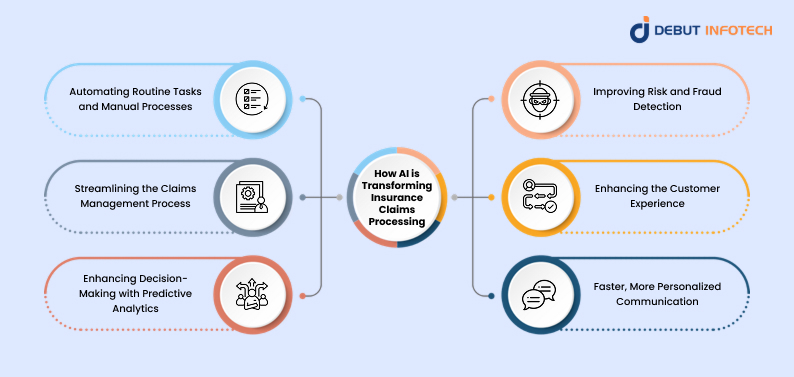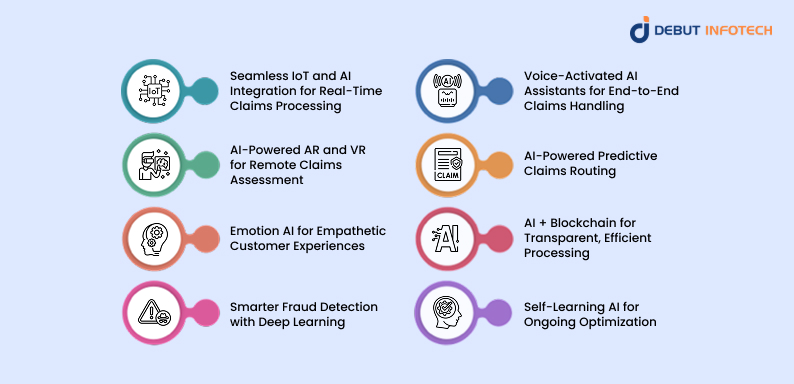Table of Contents
Why AI for Claims Processing Is a Game Changer in Insurance
May 12, 2025

May 12, 2025
The integration of artificial intelligence within claims processing should be prioritized for detailed assessment in order to understand its complete effect on the insurance market. This is because claims processing introduces unique operational challenges and complexities beyond what standard insurance operations entail.
Moreover, claim processing acts as a vital interaction point for policyholders’ experiences because successful handling directly affects their satisfaction level and loyalty toward their insurance provider. Recognizing its importance, insurers have started to adopt AI technology because they understand its value for optimizing workflows, machine learning (ML) decision processes and better outcomes. Infact, McKinsey shows how AI-driven automation achieves up to 30% cost reduction in claims processing which simultaneously leads to accuracy improvements and higher customer satisfaction.
This blog explores AI-driven improvements in claims processing, automation advantages, relevant scenarios and related constraints for insurers to consider.
An Overview of Insurance Claims Processing Today
The traditional process to manage insurance claims requires extensive effort along with numerous complex steps. It depends intensely on manual data entry, document analysis and decision-making which leads to delays and customer dissatisfaction due to errors. Many insurance firms operate outdated systems and paper-based workflows thus they maintain both inefficiencies and elevated operational expenses. Additionally, the industry faces challenges such as preventing fraud cases and detecting exact risks while satisfying escalating customer demands for faster processing.
These current problems demonstrate why the insurance sector needs immediate digital transformation. As technology evolves, insurers must integrate innovation like AI-powered claims processing into their operations in order to maintain competitiveness while meeting modern customer requirements. Artificial intelligence (AI) adoption in claims processing brings a groundbreaking solution which eliminates existing inefficiencies and reshapes how claims management operates. By leveraging AI algorithms, insurers can automate fraud detection, enhance risk assessment accuracy, and accelerate decision-making, reducing delays and operational costs while improving customer satisfaction.
Wondering How AI Can Turn Claims Processing from Painful to Powerful?
Manual reviews, delays, and fraud headaches don’t have to be the norm. Discover how AI automates decisions, accelerates approvals, and spots risks with precision, all while keeping customers smiling. Dive into our blueprint for claims that are faster, fairer, and fraud-resistant.
How AI is Transforming Insurance Claims Processing
Artificial Intelligence technology is transforming insurance operations particularly through its impact on claim processing. Artificial Intelligence uses algorithms to automate tedious tasks and generate fast intelligent decisions that improve efficiency, accuracy and user experience.

1. Automating Routine Tasks and Manual Processes
The main benefit AI provides in claims processing includes automation for manual repetitive work. Machine learning algorithms transform large data collections, structured and unstructured data such as policy documents, medical reports and police statements into valuable information which minimizes the need for document review and data entry tasks.
Lemonade, a digital-first insurer, reported settling a claim in just 3 seconds using its AI-powered bot, Jim, demonstrating AI’s potential to accelerate claims processes.
2. Streamlining the Claims Management Process
The implementation of AI insurance claims processing through intelligent workflows simplifies the complete claims management process. These systems conduct initial claim processing by directing claims to targeted departments as well as executing straightforward claim settlements through automated processes.
For example, Ping An Insurance achieves automatic auto damage claim processing through real-time analytics and image recognition via AI development services, which shortens settlement time by 70% and leads to improved customer satisfaction.
3. Enhancing Decision-Making with Predictive Analytics
AI goes beyond automation by enabling smarter, data-driven decisions. Predictive analytics help insurers achieve better outcomes through precise claim severity assessments, accurate cost forecasting and high-risk case detection.
For instance, Swiss Re uses machine learning models for health and accident claim forecasting that enhances underwriting accuracy and prevents losses up to 20% better than previous methods.
4. Improving Risk and Fraud Detection
AI provides major support for insurance fraud detection through its ability to analyze extensive data and detect unusual patterns using sophisticated AI tools. Through AI-based claims processing automation Aviva detected 12,000 fraudulent claims resulting in value of £113 million according to its reports.
5. Enhancing the Customer Experience
AI-powered chatbots and virtual assistants, a product of advanced AI Chatbot development, supply continuous support for policyholders, streamlining AI in insurance claims processing by enabling instant assistance during claims filing procedures. A PwC report revealed that 74% of insurance customers are comfortable using AI tools, with many preferring digital channels for convenience
6. Faster, More Personalized Communication
AI provides real-time policyholder updates through custom communication channels which use data from past interactions to personalize messages.
For example, the implementation of AI-powered chatbots at Progressive Insurance resulted in better personalized communication which led to improved 25% customer satisfaction ratings.
Advantages of AI in Claims Processing
The implementation of AI-powered claims automation technology provides numerous advantages that improve both business performance and customer experiences. The various outcomes generated by this approach give insurance firms superior control over their claim management activities. Here are some benefits of AI in claims processing:
1. Faster Processing
Traditional claims processing depends on manual tasks which create delays throughout the procedure. AI-powered claims processing can rapidly analyze and interpret large volumes of data using advanced analytics, thus reducing claim processing duration. This leads to quicker resolutions, lower costs, and enhanced customer experiences.
2. Advanced Fraud Detection
Through pattern analysis of data, AI systems successfully detect potential cases of fraud alongside anomalous behavior. The system utilizes internal and external data sources to identify abnormal behavior through its AI capabilities.
Insurance firms partnering with AI consulting firms can further enhance these systems, ensuring robust protection of claim process integrity.
3. Smarter Prioritization
Artificial intelligence technology evaluates claims through their level of complexity and urgency to generate proper categorizations and prioritizations for processing. This ensures that high-priority cases are handled swiftly by the most qualified personnel, improving efficiency and customer outcomes. With better workload distribution, ai-powered claims processing enhances productivity while reducing individual burdens.
4. Regulatory Compliance
The implementation of AI enables continuous claim compliance monitoring and automatic alerts when regulatory violations are detected. This reduces legal risks and safeguards reputation, while AI data security ensures sensitive information remains protected during audits.
5. Stronger Team Collaboration
AI agents provide accessible real-time data analytics which improves collaboration between different teams. This enables effective communication and coordination through remote or decentralized work environments with minimal in-person interaction. It enhances team coordination while improving both operational decision-making and organizational effectiveness.
6. Efficient Claims Validation
AI systems can automatically validate claims by comparing submitted information against policy terms and historical data using advanced AI models. They help prevent errors, inconsistencies and non-compliance by reducing overreliance on human oversight which results in better accuracy. This optimized validation method generates financial benefits and establishes stronger system credibility.
7. Improved Reporting
AI tools process complex data sets to produce detailed, accurate reports which deliver rapid results. These reports assist with internal audits, compliance checks and provide essential information for making informed decisions.
Through AI-driven insights, organizations can discover trends and patterns which lead to strategic planning and enhanced resource allocation.
The Future and What Lies Ahead

After exploring various dimensions of AI-powered claims management, let’s look at how these innovations are expected to evolve.
1. Seamless IoT and AI Integration for Real-Time Claims Processing
- Example: Health insurance organizations can receive immediate health metrics from smartwatch devices through connected Artificial Intelligence (AI) systems. A critical event such as a heart attack, becomes detectable by AI in healthcare claims processing which can validate the claim, authorize emergency care and provide notification to healthcare providers instantly.
2. AI-Powered AR and VR for Remote Claims Assessment
- Examples: Adjusters in commercial property insurance could perform virtual warehouse and office inspections with VR headsets while AI analyzes recorded content for damaged equipment and inventory cost assessment. Partnering with AI development companies ensures robust tools for generating accurate, automated damage reports, reducing manual effort.
3. Emotion AI for Empathetic Customer Experiences
- Example: AI in claims processing now prioritizes human-centric interactions. Life insurance post-accident calls could use Emotion AI technology to detect claimant stress or grief through voice analysis which would trigger automated audio modifications and alert a human agent if emotional sensitivity levels reach certain thresholds.
4. Smarter Fraud Detection with Deep Learning
- Example: The application of deep learning models within travel insurance evaluates strange booking patterns, claim rates and discrepancies in travel activities to identify fraudulent claims of overstated lost luggage numbers or repeated trip cancellations.
5. Voice-Activated AI Assistants for End-to-End Claims Handling
- Example: The integration of a voice assistant into health insurance systems grants policyholders the ability to communicate symptoms verbally while receiving pre-diagnoses and automatically processing health claims before scheduling telemedicine appointments.
6. AI-Powered Predictive Claims Routing
- Example: AI technology would assess property insurance claims stemming from natural disasters to direct them towards trained local specialists specialized in disaster recovery processes.
7. AI + Blockchain for Transparent, Efficient Processing
- Example: A combination of AI technology and blockchain systems would create an effective mechanism for tracking damaged cargo reports, transit records and weather disturbance data while speeding up the claims process for lost or damaged merchandise.
8. Self-Learning AI for Ongoing Optimization
Example: An AI system used by a multinational insurer can detect regional claim patterns and adapt its processes to meet local market requirements combined with customer preferences and emerging threats including cybercrime and extreme weather.
Don’t Let Legacy Systems Hold Your Claims Back. Let’s Fix It.
AI isn’t magic, it’s a tool, and we’ll show you how to wield it. Our team designs AI solutions that fit your workflow, whether it’s slashing processing time, reducing errors, or outsmarting fraud. Book a free 30-minute consult and walk away with a plan to implement transformative AI use cases, making claims your competitive edge
Final Thoughts
The implementation of AI for automated claims management by insurance companies in 2025 will prove to be a shrewd decision. It reduces operational costs, improves customer satisfaction, strengthens brand reputation, and benefits all stakeholders.
However, it’s crucial to recognize the limitations of AI in this field. AI contributes critically to operational efficiency within claims processing yet human involvement maintains vital importance to address intricate and sensitive scenarios.
Building a claims automation solution during 2025 entails investments starting from $6,000 for basic chatbots and extending to $50,000 or more for advanced systems that include advanced systems that leverage generative AI in claims processing and fraud detection tools. The expert team at Debut Infotech is ready to help you develop and implement the right AI solution tailored to your needs. Partner with us to hire AI developers and implement the right AI solution tailored to your needs today!
Frequently Asked Questions (FAQs)
A. An Insurance Claim AI Agent streamlines the claims process by handling email communications, verifying claim information, evaluating incidents based on predefined criteria, and drafting responses to claimants. This results in a quicker, more accurate claims experience and improved operational efficiency.
A. According to strong AI, a computer is not just a tool for studying the mind. Instead, with the right programming, a computer can actually be a mind—it can truly understand and possess cognitive states, just like a human.
A. A major hurdle in adopting AI in insurance is maintaining data privacy and security. Insurance companies handle large volumes of sensitive customer information, making it essential to protect this data’s confidentiality and integrity.
A. Start by reviewing each claim to identify the reasons for any delays or stagnation. Next, establish a clear process for handling claims by creating training materials, offering one-on-one coaching, and implementing updated standard operating procedures (SOPs) and policies.
A. Claims processing involves the tracking, documentation, and payment of claims. It plays a vital role in the insurance industry, although not all insurance providers offer this service directly.
Our Latest Insights



Leave a Comment